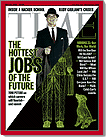
-
Hot Jobs
Time's Pick for 2025
from The Jobs Letter No.125 / 2 June 2000
"For the brave, a new world indeed"
— Time editors
"Our World, Our Work" is the latest installment of Time magazine's Visions of the 21st Century series, and it features the magazine's predictions on the future of work in the next 25 years. The Time report (available in its US print edition only, or on the internet) includes articles by management guru Tom Peters, US General Wesley Clark, corporate philosopher Francis Fukuyama and Nobel prizewinning economist Amartya Sen, among others.
Time predicts that the internet will become "a great nexus of efficiency" over the next 25 years, with "white collar robots" handling all manner of tasks that white-collar humans used to do. The 21st century worker will be a multi-talented freelancer, hooked up to faceless co-workers around the world and "...living on his reputation, not his relationship with the boss."
What will be the 10 hottest jobs in 2025? Here's a summary of the Time list:
1. Tissue Engineers.
Man-made skin is already on the market and artificial cartilage not far behind. Researchers
have successfully grown new intestines and bladders inside animals' abdominal cavities, and work
has begun on building liver, heart and kidney tissue.
2. Gene Programmers.
Digital genome maps will allow lab technicians to create customized prescriptions, altering
individual genes by rewriting lines of computer code. After scanning your DNA for defects,
doctors will use gene therapy and "smart" molecules to prevent a variety of diseases, including
certain cancers.
3. Pharmers.
New-age farmers will raise crops and livestock that have been genetically engineered to
produce therapeutic proteins. Works in progress include a vaccine-carrying tomato and drug-laden
milk from cows, sheep and goats.
4. Frankenfood Monitors.
Genetically engineered fast-growing fish and freeze-resistant fruits will help feed an
overpopulated planet ... but such hybrids could also unwittingly wipe out the food chain. Eco-scouts will
be on the lookout for so-called Trojan gene effects, and bounty hunters will help
environmental authorities eliminate transgenic species that get out of hand.
5. Data Miners.
Research gurus will be needed to extract useful tidbits from mountains of data.
6. Hot-line Handymen.
Remote diagnostics will take care of most of your home electronics, but a few repairmen will
still make house calls ... via video phone.
7 .Virtual-reality Actors.
Pay-per-view will become pay-per-play, allowing these actors to interact with you in
cyberspace dramas.
8. Narrowcasters.
Today's broadcasting industry will become increasingly personalized, working with advertisers
to create content (read: product placement) just for you.
9. Turing Testers.
Computer engineers will continue to measure their efforts to mimic human intelligence, as
British mathematician Alan Turing suggested 50 years ago, by asking you whether you're talking to
a person or a machine. By the time you can't tell the difference, these human simulators will be
used as unflappable customer service reps as well as Internet attaches who can summarize your
e-mails and even write back.
10. Knowledge Engineers.
Artificial-intelligence brokers will translate your expertise into software, then downsize you.
... and what jobs will disappear?
Time says farewell to Stockbrokers, Auto Dealers, Mail Carriers, Insurance and Real Estate Agents (the Internet will eradicate middlemen by the millions); Teachers (it will be webeducation); Printers (Xerox hopes to produce a material that's as flexible as regular paper and as versatile as a computer screen); Stenographers (replaced by sophisticated voice-recognition software); Prison Guards (criminals will be restrained by microscopic implants) and Truckers (roads will have "smart" lanes enabling computer-driven vehicles to travel bumper to bumper at high speeds).
Source - Time Magazine (US edition) 22 May 2000. The Visions 21 series is available on the internet at http://www.time.com/time/reports/v21/

Top of Page
This Letter's Main Page
Stats |
Subscribe |
Index |
The Jobs Letter Home Page |
The Website Home Page
jrt@jobsletter.org.nz
The Jobs Research Trust -- a not-for-profit Charitable Trust
constituted in 1994
We publish The Jobs Letter









